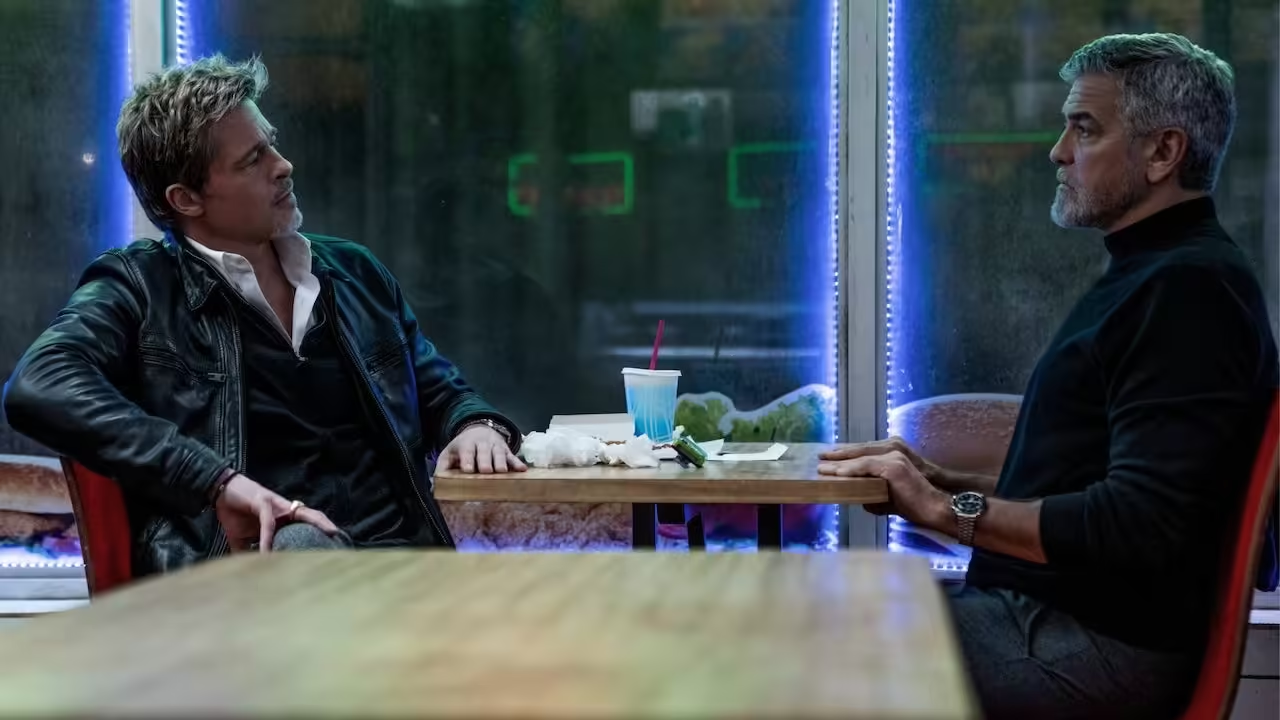Wolfs Review
Wolfs opens in theaters Friday, September 20, and streams on Apple TV+ beginning Friday, September 27. This review is based on a screening at the 81st Venice International Film Festival.
Jon Watts’ crime-comedy Wolfs gets caught halfway between humor and meaning without fully creating either one. It spotlights the charming talents of Brad Pitt and George Clooney, but it rests on its laurels, offering them half-baked material with which they can’t even conjure an ounce of their Ocean’s chemistry. The film is, at a glance, inoffensive – its assembly seems mostly competent – but makes all the wrong aesthetic decisions for a bouncy, farcical film about two criminal “cleaners” forced onto the same job.
When a middle-aged New York district attorney (Amy Ryan) finds herself in a fancy hotel room with a dead, bloody, half-naked 20something man, she panics, but has the good sense to dial a secret number she was given for just such a scandalous occasion. Clooney – smooth as ever in a black leather jacket, but with an aged, aching back – shows up and begins deleting all traces of the event. However, in an unexpected wrinkle, Pitt’s identically dressed fixer shows up too, on behalf of the hotel’s mysterious owners, with the same mission in mind.
Clooney and Pitt’s character prefer to work solo, but their dueling loyalties to the DA and the hotel respectively force them into a reluctant partnership. These initial scenes, in which they suss each other out, and try to figure out how to proceed – i.e. figure out the movie’s central premise – make for a fun introduction that gradually builds in intrigue, and eventually sends the unlikely duo on a wider mission to track down the owner of a cocaine stash they find in the course of their duties. The problems holding Wolfs back arise early and frequently from there on out.
For one thing, there’s never any sense of contrast between the two main characters. They’re both cunning, fast-talking criminal custodians who like to get things done quickly, but they have the same type of banter and ego in every scene (not unlike Dwayne Johnson and Jason Statham, whose comedic exchanges in Hobbs and Shaw proved highly repetitive). For another, its presentation feels ill-fitting. In 2015, Watts directed the engrossing 2 crime indie Cop Car; in the decade leading up to Wolfs, he made only Spider–Man films, and hasn’t had much of a chance to employ lighting as a storytelling tool the way he did in his breakout thriller. With the help of Cop Car cinematographer Larkin Seiple, he creates pools of illumination and darkness throughout every space in Wolfs, with a warm, high-contrast palette reminiscent of a classic mob movie.
Unfortunately, this works against everything the movie is trying to do. Wolfs isn’t an intense affair, and crafting it in the visage of a crime thriller creates an uncanny effect. Where Watts seems to want to tell stories with visual obfuscation, he would’ve likely benefited from allowing us to see every inch of Clooney and Pitt’s expressions at all times, rather than hiding them (and their well-established comedic gifts) in moody shadows. It’s technically pretty, and “cinematic,” but entirely wrong for this sort of caper.
Watts’ crime drama influence doesn’t end there. Though the film’s title immediately conjures thoughts of “lone wolves,” it reads simultaneously like a tribute to Harvey Keitel’s character in Pulp Fiction: Winston Wolfe, who specializes in getting rid of bodies and evidence. (For a more recent example of this archetype, see David Patrick Kelly in John Wick). These are the kinds of characters who add color and personality to crime movies by revealing and spinning yarns out of the hidden threads that make up the fabric of their fictional underworlds. (Again: See the John Wick franchise.). Centering them in their own story is by no means unworkable, but it comes with demands Watts doesn’t seem willing or able to meet. The world occupied by Clooney and Pitt’s fixers feels small, almost infinitesimal. Few other characters exist within its borders, and even fewer hint at anything interesting off-screen; Poorna Jagannathan’s doctor to the criminals June appears too briefly, and offers too little by way of idiosyncrasy to fulfill this role. A few moments early on certainly contribute to the environmental storytelling – like campaign posters with Amy Ryan’s face – but the settings of Wolfs rarely feel any more exciting or special than whichever Manhattan street corner the producers had permits to block off on a certain day.
Few 108-minute movies feel this endless
Without getting into too much detail, a secondary, younger character joins the duo’s sleuthing, which affords Clooney a handful of dramatic moments in which his character ruminates on the job’s isolating nature. This theoretically injects the film with the question of whether the two men will get along (or allow themselves to), but it never fleshes out the emotional contours of Clooney’s character – let alone Pitt’s, who’s merely a vessel for all things “cool” – resulting in a story with no real dramatic weight. That his character is allegedly lonely is something said, rather than inferred, experienced, or seen.
This would be forgivable had the movie managed to twist its comedic screws, but it plays a single note throughout. The two leads bicker by repeating words in successive sentences – “Are you the person?” “I’m not the person!” “Then where’s the person?!” – giving Wolfs the feel of a slick student film from a rich teen who’s subsisted on a media diet of early Guy Ritchie. Worse yet, Watts’ script draws attention to the dialogue’s repetitive nature in a failed attempt to hang a lantern on its flaws. Its characters even call one plot development “lazy bullshit” before decreeing that its logistics don’t matter, as though Watts had written his second draft in Deadpool pajamas.
The more that Wolfs continues (and boy does it; few 108-minute movies feel this endless), the more insulting it becomes to watch. Granted, by virtue of existing, it deserves to have its day in theaters, but Apple pulling back on its theatrical release in favor of streaming will guarantee far fewer customers are unhappy with having to pay for a ticket to a film that barely tries. How you squeeze a sequel out of this is anyone’s guess – and ultimately Watts’ problem. Maybe he has the number of a guy who can help solve it.










